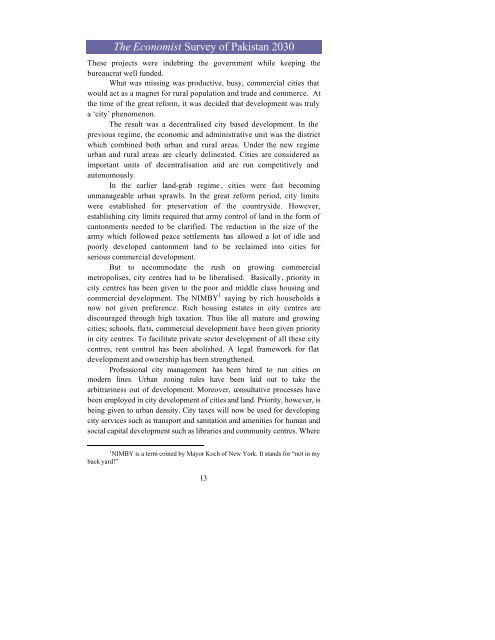economist-survey
economist-survey
economist-survey
You also want an ePaper? Increase the reach of your titles
YUMPU automatically turns print PDFs into web optimized ePapers that Google loves.
The Economist Survey of Pakistan 2030<br />
These projects were indebting the government while keeping the<br />
bureaucrat well funded.<br />
What was missing was productive, busy, commercial cities that<br />
would act as a magnet for rural population and trade and commerce. At<br />
the time of the great reform, it was decided that development was truly<br />
a ‘city’ phenomenon.<br />
The result was a decentralised city based development. In the<br />
previous regime, the economic and administrative unit was the district<br />
which combined both urban and rural areas. Under the new regime<br />
urban and rural areas are clearly delineated. Cities are considered as<br />
important units of decentralisation and are run competitively and<br />
autonomously.<br />
In the earlier land-grab regime , cities were fast becoming<br />
unmanageable urban sprawls. In the great reform period, city limits<br />
were established for preservation of the countryside. However,<br />
establishing city limits required that army control of land in the form of<br />
cantonments needed to be clarified. The reduction in the size of the<br />
army which followed peace settlements has allowed a lot of idle and<br />
poorly developed cantonment land to be reclaimed into cities for<br />
serious commercial development.<br />
But to accommodate the rush on growing commercial<br />
metropolises, city centres had to be liberalised. Basically, priority in<br />
city centres has been given to the poor and middle class housing and<br />
commercial development. The NIMBY 1 saying by rich households is<br />
now not given preference. Rich housing estates in city centres are<br />
discouraged through high taxation. Thus like all mature and growing<br />
cities; schools, flats, commercial development have been given priority<br />
in city centres. To facilitate private sector development of all these city<br />
centres, rent control has been abolished. A legal framework for flat<br />
development and ownership has been strengthened.<br />
Professional city management has been hired to run cities on<br />
modern lines. Urban zoning rules have been laid out to take the<br />
arbitrariness out of development. Moreover, consultative processes have<br />
been employed in city development of cities and land. Priority, however, is<br />
being given to urban density. City taxes will now be used for developing<br />
city services such as transport and sanitation and amenities for human and<br />
social capital development such as libraries and community centres. Where<br />
back yard!”<br />
1 NIMBY is a term coined by Mayor Koch of New York. It stands for “not in my<br />
13




